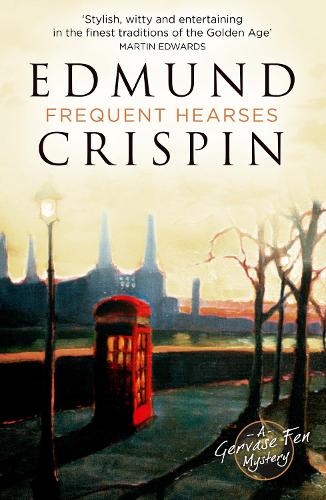
Frequent Hearses (A Gervase Fen Mystery)
(Paperback)
Publishing Details
Frequent Hearses (A Gervase Fen Mystery)
By (Author) Edmund Crispin
Introduction by Val McDermid
HarperCollins Publishers
Collins Crime Club
9th February 2024
17th August 2023
United Kingdom
Classifications
General
Fiction
Classic crime and mystery fiction
823.912
Physical Properties
Paperback
256
Width 129mm, Height 198mm, Spine 20mm
270g
Description
As inventive as Agatha Christie, as hilarious as P.G. Wodehouse discover the delightful detective stories of Edmund Crispin. Crime fiction at its quirkiest and best.
When young actress Gloria Scott throws herself from Waterloo Bridge, the news sends shockwaves through her film studio. Luckily Gervase Fen is in London to investigate.
But when someone acts fast to cover up any evidence removing all signs of Ms Scotts identity from her apartment and poisoning a suspicious cameraman the truth is hard to find
Reviews
Both the mature and the discerning young choose to pick up one of Crispin's beautifully turned crime novels The Times
Crispin isn't in it for the mystery, but for the enigmas Guardian
His books are full of high spirits and excellent jokes, with constant literary allusions and an atmosphere of bibulous good humour. But at times the mood turns darker, and Crispin is capable of passages of both genuine suspense and ingenius deduction Daily Telegraph
Crispin is noted for an ability to embellish clever story lines with Marx Brothers touches New York Times
Rightly elevated to classic status New York Sun
Author Bio
Robert Bruce Montgomery was born in Buckinghamshire in 1921, and was a golden age crime writer as well as a successful concert pianist and composer. Under the pseudonym Edmund Crispin, he wrote nine detective novels and forty two short stories, combining farcical situations with literary references and sharply observed characterisation. His professional film scores included the well-known scores for the Carry On series. Montgomery graduated from St. Johns College, Oxford in 1943 and was part of a famous literary circle including Kingsley Amis and Philip Larkin. In addition to his reputation as a leader in the field of mystery genre, he was the regular crime-fiction reviewer for the Sunday Times from 1967 and contributed to many periodicals and newspapers and edited science-fiction anthologies. After the golden years of the 1950s he retired from the limelight to live out a hermetic existence in Totnes in Devonshire until his death in 1978.
